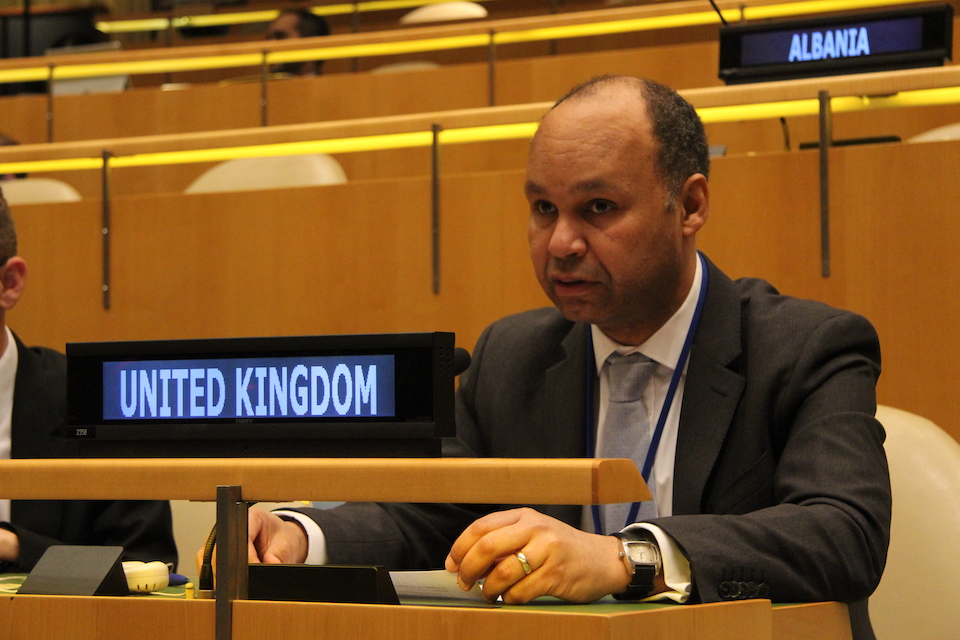UN adopts UK co-sponsored resolution on climate change: UK at the UN
Statement by Ambassador James Kariuki to the UN General Assembly following the adoption of a resolution requesting an Advisory Opinion on Member States’ climate change obligations from the International Court of Justice

Thank you, President.
We thank Vanuatu and the core group presenting this resolution for the positive and constructive approach they have taken toward negotiations, and in particular welcome the presence of Prime Minister Kalsakau in this meeting.
The United Kingdom is committed to taking ambitious action to tackle climate change, biodiversity loss and environmental degradation. We were proud to host COP26 in Glasgow, where all 197 Parties agreed to the Glasgow Climate Pact. At COP26, nature also moved from the margins of the debate on climate change to the heart of it. The UK will continue to lead and engage on climate change and on nature to make sure that promises are kept and delivered to the highest standards, working with all partners to maintain momentum.
The UK is especially proud of its work with Small Island Developing States and Least Developed Countries, both in its capacity as COP26 Presidency, and also beyond this. The UK recognises that all States are vulnerable to the impacts of climate change and that SIDS are some of the most vulnerable.
In this regard, the UK set up Climate & Development Ministerials to focus on priorities of climate vulnerable states. We co-lead with Fiji the Taskforce on Access to Climate Finance to improve access to climate finance for SIDS and climate vulnerable States. We have also created programmes like the SIDS Capacity and Resilience Programme and the Infrastructure for Resilient Island States facility. In addition, the UK was instrumental in securing agreements and funding to set up and develop the Santiago Network, to provide technical assistance for the implementation of approaches for averting, minimising and addressing loss and damage.
We welcome the ICJ considering the current obligations of all States under international law to ensure the protection of the climate system and other parts of the environment from anthropogenic emissions of greenhouse gases, and the legal consequences where states, by their acts or omissions, breach such obligations, causing significant harm. By looking at the obligations as they are today, the questions are clearly focused on assisting States in understanding these obligations under international law, so that they are able to comply with them in the future and understand the consequences if they breach them.
In particular, we are pleased to make the following four observations on the questions:
-
First, they are not determinative of whether there are obligations or where they flow from.
-
Second, they do not prejudge whether breaches have occurred, are occurring or will occur but look at the consequences if and when they do.
-
Third, they are not limited to considering the obligations and legal consequences for any specific State or States; and
-
Finally, they are not determinative of whether any States have been specially affected or injured.
The United Kingdom’s co-sponsorship of the resolution today is without prejudice both to its position on, and interpretation of, the obligations, instruments and concepts to which this resolution refers and to any submissions by His Majesty’s Government before the ICJ and other courts and tribunals. We also note that the first question is focused on the obligations relating specifically to anthropogenic emissions of greenhouse gases.
Increasing climate action is a top priority for the United Kingdom. The IPCC says to keep 1.5 alive we need emissions to peak in 2025, to halve by 2030 and reach net-zero by 2050. We recognise the UNFCCC as the primary intergovernmental negotiating forum for climate action. An ICJ Advisory Opinion may help to refocus efforts to deliver on climate commitments in this critical decade, which would support the UNFCCC’s agenda.
We are pleased to co-sponsor this resolution today.
Thank you.